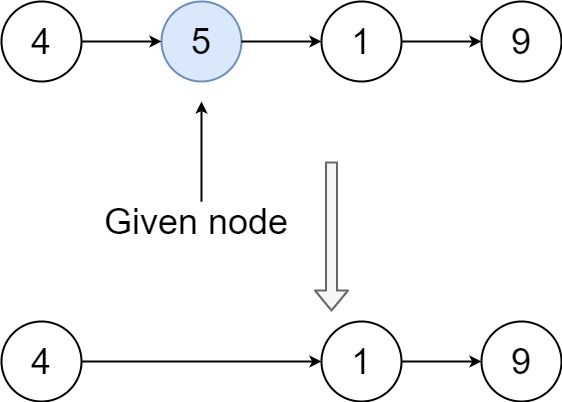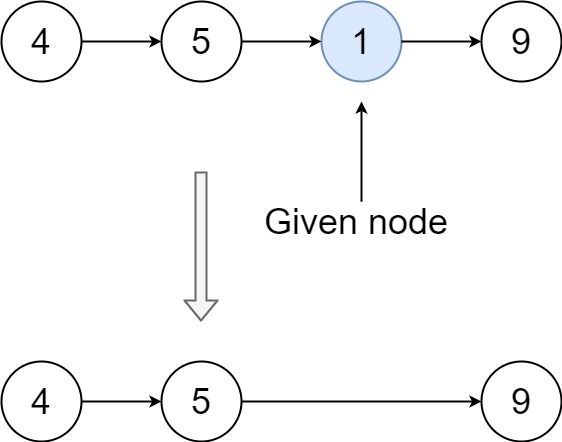Write a function to delete a node in a singly-linked list. You will not be given access to the head of the list, instead you will be given access to the node to be deleted directly.
It is guaranteed that the node to be deleted is not a tail node in the list.
Example 1:
Input: head = [4,5,1,9], node = 5 Output: [4,1,9] Explanation: You are given the second node with value 5, the linked list should become 4 -> 1 -> 9 after calling your function.
Example 2:
Input: head = [4,5,1,9], node = 1 Output: [4,5,9] Explanation: You are given the third node with value 1, the linked list should become 4 -> 5 -> 9 after calling your function.
Example 3:
Input: head = [1,2,3,4], node = 3 Output: [1,2,4]
Example 4:
Input: head = [0,1], node = 0 Output: [1]
Example 5:
Input: head = [-3,5,-99], node = -3 Output: [5,-99]
Constraints:
- The number of the nodes in the given list is in the range
[2, 1000]. -1000 <= Node.val <= 1000- The value of each node in the list is unique.
- The
nodeto be deleted is in the list and is not a tail node
# Definition for singly-linked list.
# class ListNode:
# def __init__(self, x):
# self.val = x
# self.next = None
class Solution:
def deleteNode(self, node):
"""
:type node: ListNode
:rtype: void Do not return anything, modify node in-place instead.
"""
node.val = node.next.val
node.next = node.next.next/**
* Definition for singly-linked list.
* public class ListNode {
* int val;
* ListNode next;
* ListNode(int x) { val = x; }
* }
*/
class Solution {
public void deleteNode(ListNode node) {
node.val = node.next.val;
node.next = node.next.next;
}
}/**
* Definition for singly-linked list.
* function ListNode(val) {
* this.val = val;
* this.next = null;
* }
*/
/**
* @param {ListNode} node
* @return {void} Do not return anything, modify node in-place instead.
*/
var deleteNode = function (node) {
node.val = node.next.val;
node.next = node.next.next;
};/**
* Definition for singly-linked list.
* type ListNode struct {
* Val int
* Next *ListNode
* }
*/
func deleteNode(node *ListNode) {
node.Val = node.Next.Val
node.Next = node.Next.Next
}/**
* Definition for singly-linked list.
* struct ListNode {
* int val;
* ListNode *next;
* ListNode(int x) : val(x), next(NULL) {}
* };
*/
class Solution {
public:
void deleteNode(ListNode* node) {
node->val = node->next->val;
node->next = node->next->next;
}
};
